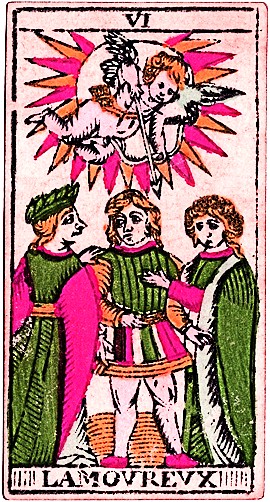One of those ethical dilemmas tarot readers have to grapple with are third party readings.
There are different kinds of third party readings; some are subtle mainly found in relationship readings, others are more blatant, where the question doesn't relate to the person requesting the reading at all.
One of those blatant third party questions I once got was How is my sister, and is her husband treating her well?
The lady, who asked was from the Asian community, and although I can only guess why she asked about her sister, it may have related to an arranged marriage.
I can completely sympathise with the client. Of course she wants to know how her sister is and if she's okay, but it's difficult to connect with third parties in a reading.
Any attempt often results in confusing, unclear or even wrong messages from the Tarot.
Still, who wouldn't want to put the client's mind at rest, reassuring her that all is well and her sister is happy.
But then I'd be guessing, at worst lying (what should I say, if I drew the Tower, Death or any other such card?).
Whatever I'd say about her sister couldn't be validated, whereas a reading for the querent directly can be.
That's another reason why third party readings such as this example are risky and should be avoided.
Most questions tarot readers get asked are about love and relationships.
What are his long-term intentions?
Is he cheating on me?
are all questions focusing on someone other than the client, yet when it comes to a relationship it takes two to make it work (or not).
How many relationship spreads include positions such as What person A brings to the relationship / what person B brings to the relationship (and person B not being present during the reading).
Person B's strengths, weaknesses and whatnot are analysed and dissected in a reading, while that person is absent.
It's very much talking behind someone's back, judging them and making choices about the relationship without them, all based on a reading.
In my time as a professional tarot reader I have noticed that questions about other people, especially in relationship readings, are deep down about the client.
When we examine in a reading what the other person is bringing to the relationship, I always point out that the answer is likely to be the perception of the querent.
For example, the Hanged Man is drawn in that position.
Rather than saying it seems like your boyfriend doesn't want to commit or wants to take your relationship further, I'd ask do you feel your relationship isn't going anywhere?, Are there circumstances that prevent you from moving forward together?
Here you can see the difference between a third party (first answer) and a client-focused (second answer) reading.
The latter can be validated by client and offers more scope to explore the bigger picture.
And yet, we still take the other person into account by looking at the relationship as a whole but from the client's perspective.
Whereas blatant third party readings should be avoided, relationship readings that take into account both parties (where one of them is absent) can be explored by focusing on the feelings and perceptions of the client in relation to their partner.
This way we don't guess the other person's intentions, and perhaps we can also help the client figure out for themselves how the other person is feeling.
How do you feel about third party readings? How do you answer them? Have you been using relationship spreads that include questions about the other - absent - person?
I'd love to hear from you💚
Warmest wishes,
Christiane
Connect with me on:
Substack - Live more Magic
Medium - Simplify your Life
Ko-Fi - Creative Tarot Journaling

No comments:
Post a Comment